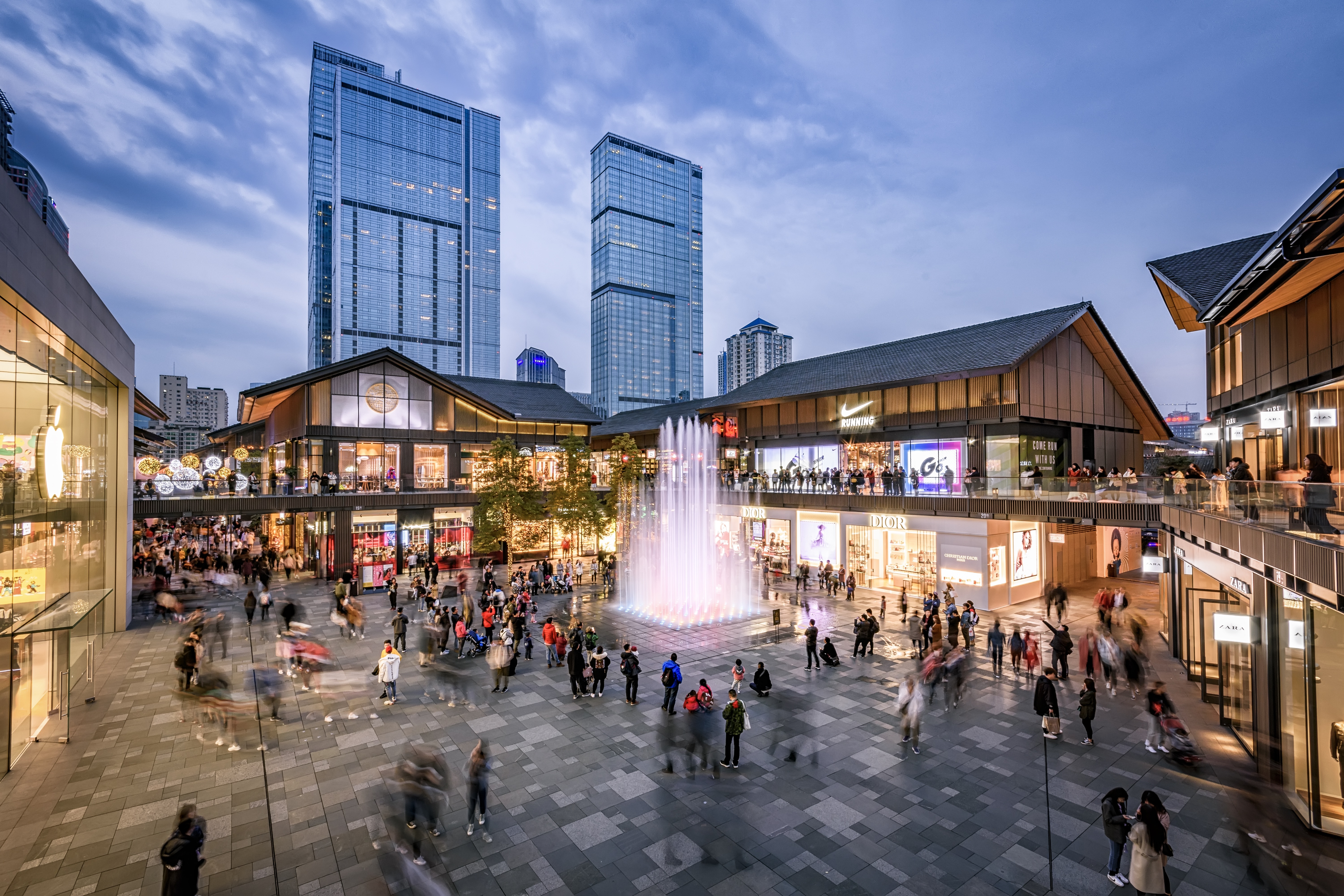Chengdu, a rising megacity based on sound governance
 0 Comment(s)
0 Comment(s) Print
Print E-mail China.org.cn, March 10, 2023
E-mail China.org.cn, March 10, 2023
Chengdu, a city with a permanent population of 21 million in west China, may offer a glance into how Chinese megacities are rising through constantly improving governance.

Sino-Ocean Taikoo Li Chengdu, a retail center that features high-end brands and upscale bars in Chengdu, capital of Sichuan province [Photo by Zhang Sheng/Information Office of Chengdu Municipal Government]
The first proposal to build Chengdu into a park city was made in 2018; in March 2022, a master plan was released to build Chengdu into a demonstrative park city practicing the New Concept for Development; more recently, at its second plenary session in December 2022, the 14th CPC Chengdu Municipal Committee announced a decision to turn Chengdu into a modern socialist megacity in west China with global influence and reputation.
As one of the central cities in China, and a core and growth pole in the Chengdu-Chongqing economic circle, Chengdu's answer to the questions on urban governance in the new era and its approach to how to build a park city with 21 million population are of increasing interest to the world. As a matter of fact, the city has already given its answer clearly and vigorously through its active exploration of a sound governance model, its resolve and confidence in this aspect, and the significance of its governance model to the modern governance of megacities in the world.
The path and advantages of Chengdu's governance have gradually shown.
Chengdu, the happiest Chinese city for 14 years
Downtown areas, urban new areas, and suburban towns in Chengdu, in accordance with their respective development foundation and resources, are all accelerating efforts to foster a multi-center network development pattern, in which basic functions are met locally, core functions are supported by each other, and the strength of characteristic functions is highlighted.
In downtown areas, there are more and more beautiful streets attracting people to visit; in urban new areas, driverless passenger buses and cars are being tested; in suburban new towns, villagers who used to work away are returning, and those from outside are coming, to invest and star business, with new business scenes and forms springing up.
From building a park city to building a demonstrative park city practicing the New Concept for Development, Chengdu has been a trailblazer. It has systematically explored new practices to promote the harmony between the natural environment, people and city, and new paths to transform megacities.
For example, Chengdu is developing an integrated park system as an important means to build a park city. Programs in the respect include the Longquan Mountain Urban Forest Park, the Giant Panda National Park, the Jincheng Park, and Jinjiang Park.
In addition, Chengdu launched ten major programs for happy life in 2021 to constantly enhance local residents' sense of security, happiness, and fulfillment.
With these efforts, Chengdu was named the happiest Chinese city in 2022, the 14th time in a row.
In addition to the better environment and the growing recognition of local residents, the more important factor that set off the rapid industrial development of Chengdu is the shift in the city's governance model from "industry-city-people" to "people-city-industry." Chengdu's evolving industrial plans in recent years have all shown that the city has already drawn an holistic blueprint for its industrial development.
Chengdu, a smart city
In recent years, Chengdu has been actively building a governance system compatible with a demonstrative park city. With its unremitting efforts in improving community governance led by Party building, along with the systematic implementation of the ten major programs for happy life, Chengdu has laid a good foundation for city governance based on collaboration, participation, and common gains.
After systematic, holistic and integrated efforts, community development and governance in urban and rural Chengdu has been much improved, by building institutional frameworks, leveraging the leading role of demonstrative communities, coordinating major programs, and integrating into the overall strategy. Strong impetus and vitality has emerged for modernizing Chengdu's primary-level governance system and capacity.
Now, community affairs, including the solution of problems from the lack of parking lots to the difficulty in finding nearby places to buy vegetables, are all decided by its residents.
However, for some longstanding problems and newly emerging ones in the governance of modern cities, traditional methods often fail. In this case, smart solutions offer the best way out.
Last November, the Smart City Expo World Congress was held in Chengdu, gathering experts and scholars in the field of smart cities from home and abroad to hold in-depth exchanges.
From digital, intelligent to smart solutions, Chengdu has been committing itself to digitalizing its economy, local residents' life, and city governance, and seeking intelligent and smart transformation.
A unified cloud platform for government affairs has been available in Chengdu, bringing together over 1,500 apps of city- and county-level government departments. Smart service platforms have also been launched to facilitate locals' access to public services; 90 percent of government services can be handled online now; for services requiring presence in person, they can all be provided in a one-stop way; a cloud platform has also been put in service, featuring over 800 urban services concerning people's wellbeing, commuting, fee payment, employment, entrepreneurship, and information inquiry.
At its second plenary session in December 2022, the 14th CPC Chengdu Municipal Committee instructed that Chengdu will upgrade its functions to promote high-quality development, work to provide better life to enhance people's sense of happiness, and seek greater smart transformation to improve governance efficiency, with specific tasks clearly set out accordingly. With all these efforts, the city is determined to develop into a modern socialist megacity in west China with global influence and reputation.





